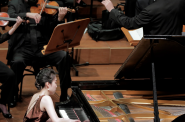Folk Music of the Future. Sort Of
Present Music's next concert offers a wild mix of music, performers and instruments.
This weekend, Friday, Feb. 17, and Saturday, Feb. 18, Present Music will perform Future Folk Machine, a bold program of imagined paths for the future of folk music. Folk music is defined fairly broadly. Co-artistic director Eric Segnitz suggests a more abstract theme, “The pieces have folk elements, but are tied together by an imaginary leap. They go to unexpected places.”
Two song cycles on the program explore personal worlds from a contemporary perspective. They are positioned somewhere between folk and art song. Both offer intense perspectives calling for dramatic scoring.
Soprano Ariadne Greif will sing. Praised for her “luminous, expressive voice,” “searing top notes,” and “dusky depths,” (New York Times), she has premiered over a hundred new works and more than a dozen new operas.
The Secret Diary of Nora Plain by Morris Kliphuis and Lucky Fonz III tells the intimate story of a girl who tries to lead her own life in a world that encroaches on her further and further — into her innermost thoughts and feelings. Nora responds to her vulnerability from social media, exacerbated by intrusive surveillance technologies that suggest a future dystopia with real elements today.
Nora complains about intrusions into her life in the song Here is My Arm:
Come closer to me then
Come closer, stand near
Peek at these freckles
Right next to my ear
…
Sing of the whole world
But don’t sing of me
In the song Rat in my Room, she fantasizes about a metaphorical rat representing surveillance:
Smoke it out, take it down
Hang it from the highest tree
Beat it, beat it, beat it up
Let it never ever come for me
This song cycle presents a personal and heartbreaking narrative about relations between society, privacy, paranoia and eroticism.
Mirabai Songs by John Harbison are musical settings of six poems by Indian princess Mirabai Rathor, who lived during the sixteenth century. The often obscure poetry has been explored by scholars in detail. Princess Rathor challenged the traditions of Indian society while embracing Krishna as a personal god:
I went to the market and bought the Dark One.
You claim by night; I claim by day.
You say I gave too much; I say too little.
She was married to Krishna, she argued, trying to reject an arranged marriage:
The colors of the Dark One have penetrated Mira’s body; all the other colors washed out.
Making love with the Dark One and eating little; those are my pearls and my carnelians.
She did not view herself as a widow when her husband died, so she would not obey the command to throw herself on the funeral pyre. But she imagines sacrificing herself to her faith:
No one knows where to find the Bhakti path; show me where to go.
I would like my own body to turn into a heap of incense and sandalwood as you set a torch to it.
A variety of shorter instrumental works also explore fresh perspectives by revisiting more familiar compositions.
A classic minimalist piano etude by György Ligeti, Etudes Book III 15. White on White, is transformed through a transcription for an exotic electronic instrument, the Ondes Martenot. Select here to listen to that version. In this case, two performers play Martenot samples on synthesizers.
Another maverick, Steve Martland reinterprets a French Baroque composition by Marin Marais for viola da gamba, Sonnerie de Saint Geneviève du Mont-de-Paris. His Remix Live takes what was a serene and refined affair and turns it into a raucous and unruly romp. The energy of a Baroque chaconne repeating bass line emerges in a rock interpretation, an insistent repeating rhythm common in contemporary music but without the refinement of the Marais original.
Present Music often includes a playful piece on completely unusual instruments. Francesco Filidei‘s Love Story (2020) would seem to fill that expectation. The work is composed for seven rolls of toilet paper. “When you talk about a leap of imagination,” Segnitz comments, “a roll of toilet paper is used to relate a universal human experience.” A pitch-free rhythm sounds like a heartbeat. The experiment works, Segnitz insists. “Filidei is a quite serious composer.”
Present Music will play the program twice, at 7:30 p.m. Feb. 17 and Feb. 18 at the Jan Serr Studio, 2163 N. Prospect Ave. A live-stream option will be available on Feb. 18. In Person tickets and Livestream tickets are available online.
Present Music’s next concert, Northern Lights will be offered at the Milwaukee Art Museum on April 6. The concert includes two major world premieres: Midden Find by Dan Trueman, featuring star Irish fiddler Caoimhín Ó Raghallaigh playing the Norwegian Hardanger d’Amore; and a new commission performed by multi-genre Brazilian composer, singer and pianist Clarice Assad. The program coincides with MAM’s exhibition, Scandanavian Design and the United States, 1890-1980.
Preview
-
PianoArts Festival Features Rising Stars
 May 28th, 2024 by Michael Barndt
May 28th, 2024 by Michael Barndt
-
Four Nations Ensemble Goes For Baroque
 May 13th, 2024 by Michael Barndt
May 13th, 2024 by Michael Barndt
-
Mozart on Prospect Avenue
 May 9th, 2024 by Martha Brown
May 9th, 2024 by Martha Brown





















